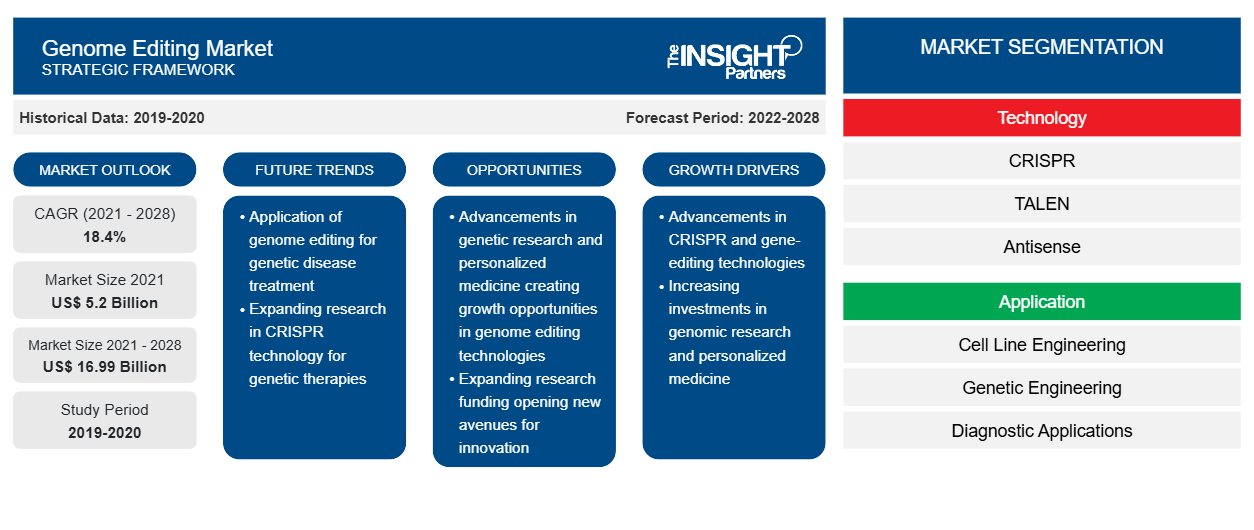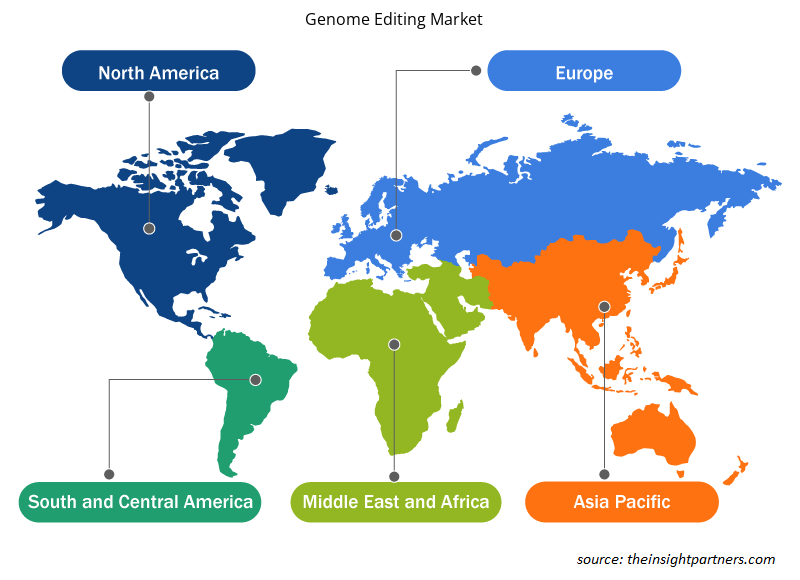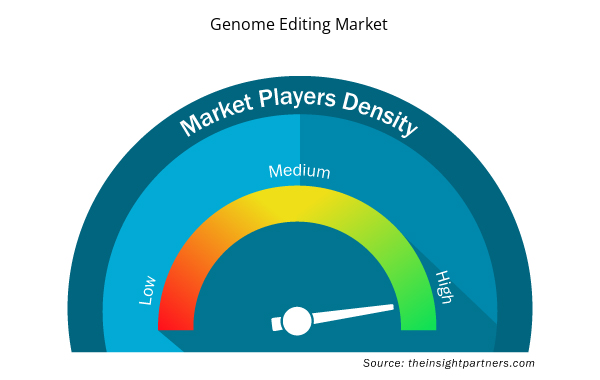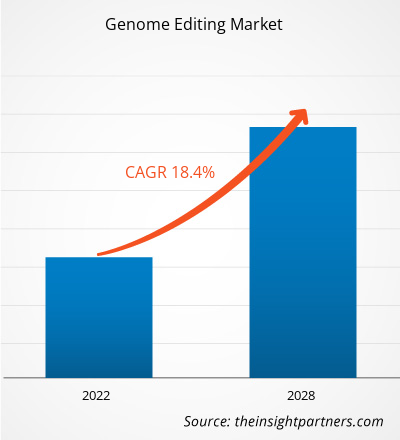[Research Report] The genome editing market size was valued at US$ 5,199.40 million in 2021 and is projected to reach US$ 16,986.69 million by 2028; it is estimated to register a CAGR of 18.4% from 2021 to 2028.
Analyst’s Viewpoint
Genome editing technique is utilized for the changes that are to be done in the DNA of a cell or an organism. The technique involves cutting DNA sequences for the addition or removing the DNA in the genome. The changes in the genome are done for the required characteristics of the cell. Genome editing is done for the research purpose, the treatment of the diseases, and the biotechnological purpose. The global genome editing market growth is attributable to the rise in prevalence of cancer & other genetic disorders and continuous technological advancements in gene-editing tools are factors driving the market growth. Furthermore, technological advancements in healthcare IT allow the use of artificial intelligence (AI) for manufacturing CRISPR Systems which are expected to foster genome editing and enhance the genome editing market growth in the coming years. For instance, In March 2019, Oxford Biomedica plc collaborated with Microsoft Research for R&D of cloud and machine learning to improve the production and quality of next-generation gene therapy vectors such as LentiVector. Under this collaboration, Oxford Biomedica has utilized Microsoft’s Azure intelligent cloud platform to develop in silico models and innovative algorithms to advance the next-generation cell and gene delivery technology.
Market Overview
Genome editing or gene editing is a type of genetic editing that involves inserting, removing, or replacing DNA in an organism's genome to treat a particular disease with an engineered nuclease or molecular scissors. The nucleases create site-specific double-stranded breaks in the genome where they are repaired by either nonhomologous end joining or homologous recombination, resulting in a targeted mutation. Some of the factors driving the genome editing market growth include an increase in cancer and other genetic disorders, a growing preference for personalized medicine, a rise in private and public funding, and rapid advances in sequencing and genome editing technologies. Another factor contributing to the genome editing market growth is collaboration. Eli Lilly, for example, partnered with Precision BioSciences in November 2020 to develop in vivo treatments for genetic disorders using the ARCUS platform, a collaborative effort that could generate USD 2.7 billion for the Durham, NC, company, which develops genome editing and CAR T immunotherapies. Thus, collaborations would increase genome editing market growth during the forecast period.
Customize This Report To Suit Your Requirement
You will get customization on any report - free of charge - including parts of this report, or country-level analysis, Excel Data pack, as well as avail great offers and discounts for start-ups & universities
Genome Editing Market: Strategic Insights

- Get Top Key Market Trends of this report.This FREE sample will include data analysis, ranging from market trends to estimates and forecasts.
Customize This Report To Suit Your Requirement
You will get customization on any report - free of charge - including parts of this report, or country-level analysis, Excel Data pack, as well as avail great offers and discounts for start-ups & universities
Genome Editing Market: Strategic Insights

- Get Top Key Market Trends of this report.This FREE sample will include data analysis, ranging from market trends to estimates and forecasts.
Market Driver
Rise in Prevalence of Cancer and Other Genetic Disorders
According to the World Health Organization (WHO), cancer is the biggest cause of death worldwide, with approximately 10 million deaths in 2020. Overall, the global burden of cancer incidence and death is quickly increasing, reflecting both population aging and growth, as well as changes in the prevalence and distribution of the key cancer risk factors, many of which are related to socio-economic development. CANCER TODAY enabled a comprehensive assessment of the cancer burden worldwide in 2020, based on the GLOBOCAN estimates of incidence, mortality, and prevalence for 2020 in 185 countries or territories for 36 cancer types by sex and age group. According to the recent estimates, the incidence of cancer has been increasing at an alarming rate, making hepatocellular carcinoma (HCC the fifth most common cancer in men and the seventh most common cancer in women. HCC is likely to contribute to ~5.6% of all human cancers, thereby increasing the burden in 2020. The HCC is known to be the second leading cause of cancer-related deaths worldwide. Almost 85% of HCCs occur in developing countries. Other types of liver cancers are cholangiocellular carcinoma (CCC), a malignant disease of the liver bile ducts, and hepatoblastoma. Hepatoblastoma is the most common malignant tumor of the liver in children. According to the Centers for Disease Control and Prevention (CDC), ~21,000 men and ~8,000 women develop liver cancer each year in the US, and about 16,000 men and 8,000 women die from the disease. Thus, a rise in the global prevalence of liver diseases, including chronic and acute diseases and microbial infections, increases the demand for liver models.
A chromosomal abnormality can be detected in about one out of every 150 live births. Yet even this high incidence represents only a small fraction of chromosome mutations since the vast majority are lethal and result in prenatal death or stillbirth. Indeed, 50% of all first-trimester miscarriages and 20% of all second-trimester miscarriages are estimated to involve a chromosomally abnormal fetus. Although Down syndrome is the most well-known and well-recognized autosomal trisomies, it is only diagnosed in around one out of every 800 live births. Many cancer biology investigations are now using CRISPR as a standard approach. The CRISPR/Cas9 system has been shown to be effective in treating metastatic tumors, which is a big step toward discovering a cancer cure. The CRISPR-LNPs system contains a messenger RNA that encodes for the Cas9 CRISPR enzyme, which operates as molecular scissors to cut the DNA of cells. CRISPR-based studies have opened new doors to treating hereditary or developmental neurological disorders (HNDs) such as fragile X syndrome and Down syndrome.
Thus, the increasing factors of genome editing are expected to boost the genome editing market growth during the forecast period.
Segmental Analysis
Technology Insights
Based on technology, the genome editing market is segmented into CRISPR, TALEN, antisense, and other. The CRISPR segment is likely to hold the largest share of the market in 2021 and is anticipated to register the highest CAGR in the market during the forecast period, due to their incumbent usage, high volume consumption, and product innovation. The clustered regularly interspaced short palindromic repeats (CRISPR) are associated with the Cas genes that essential for adaptive immunity in selected bacteria and archaea. The CRISPR enables the organisms to respond the changes and elimination of invading genetic material. There are types of the CRISPR mechanisms have been adopted for genome-editing protocols. The first one is wild-type Cas9, second is mutated Cas9 and the third is nuclease-deficient Cas9.
The CRISPR-Cas9 is faster, cheaper, and more accurate than the other technologies of DNA editing and is used for the wide applications. It is the simplest, most versatile, and precise method of genetic manipulation. The companies which offer the CRISPR are Sangamo Therapeutics, Editas Medicine, ThermoFisher Scientific, Horizon Discovery Groups among the others. Owing to the simple, fast, and accurate property of the CRISPR the market for the segment is expected to grow at the fastest rate in the coming forecast years.
Application Insights
The global genome editing market, based on application, is segmented into cell line engineering, genetic engineering, diagnostic applications, drug discovery, and others. In 2021, the cell line engineering segment was likely to hold the largest share of the market. Moreover, the segment is also expected to witness growth in its demand at the fastest CAGR from 2021 to 2028, owing to the rise in the detection and diagnosis of various medical conditions across the globe. Cell line engineering is majorly done in laboratories, and it is performed to understand the basic biology behind the diseases and therapeutics. Cell line engineering provides benefits such as optimizing cell lines for the recombinant protein expression and characterization of the protein profile of genetically modified organisms. Cell line engineering enables the production of various industrial and commercial products that gain much more revenue as the products are produced per the desired requirement.
The market players such as Horizon Discovery, ThermoFisher Scientific, Lonza, Merck KGaA, Biognosys, and more provide the products and services for cell line engineering. There are various advantages, such as being cost-effective, easy to use, providing an unlimited supply of material, and bypassing ethical concerns associated with the use of animal and human tissues. In addition, cell line engineering has benefitted researchers for developing a vaccine, testing drug metabolism and cytotoxicity, antibody production, the study of gene function, generation of artificial tissues (and synthesis of biological compounds. Thus, the advantages of cell line engineering are likely to grow significantly in the coming forecast years which is expected to drive the genome editing market growth.
End User Insights
The global genome editing market, based on end user, is segmented into pharmaceutical and biotechnology companies, academic and research institutes, and clinical research organizations (CRO's). In 2021, the Pharmaceutical and Biotechnology Companies segment is likely to hold the largest share of the market. Moreover, the segment is also expected to witness growth in its demand at a fastest CAGR during 2021 to 2028, owing to the rise in the detection and diagnosis of various medical conditions across the globe.
Regional Analysis
Global Genome editing market is segmented by region into North America, Europe, Asia Pacific, Middle East & Africa, and South & Central America. The North American region is the largest shareholder in the global genome editing market. The genome editing market growth is widely seen in countries such as the US and Canada, which is driven by the factors including increasing development for gene-based therapies, growing collaborations among companies and government bodies, increasing funding by the government agencies to promote technologies to develop CRISPR products and increasing demand for genome editing. Whereas Mexico is expected to offer growth opportunities for the genome editing market due to the increasing adoption of genome editing to treat genetic disorders and cancer. Also, the growing clinical trials for genome editing are expected to push genome editing market.
In North America, the US is the largest genome editing market. Livestock groups provide consumers with different products and services, including meat, milk, eggs, and others. The genetic variation within livestock helps in produces the good quality raw material for evolving through natural selection in answer to changing conditions and human-managed genetic improvement plans.
Moreover, the increasing prevalence of genetic disorders and adoption of advanced gene therapy for treatment of chronic diseases is expected to drive the market in the country in the forecast period. For instance, as per the data published by the NIH’s National Library of Medicine IN July 2021, Cystic fibrosis is among the common genetic disease observed in the white population in the US. The incidence rate for the disease is 1 in 2,500 to 3,500 white newborns. However, Cystic fibrosis is relatively lower among the other ethnic groups in the country. The disease incidence among these groups is about 1 in 17,000 African Americans and 1 in 31,000 Asian Americans. Furthermore, the factors such as the rising adoption of gene therapy for the treatment of cancer, associated products are being introduced by the market players, support of the regulatory agencies, and others are expected to support the genome editing-related market in the US. For instance, In May 2021, US Food and Drug Administration (FDA) approved Lumakras (Sotorasib) for a targeted therapy for non-small cell lung cancer patients with tumors that express the G12C mutation in the KRAS gene.
Thermo Fisher Scientific Inc.; Merck KGaA; Lonza; Horizon Discovery Group plc.; Integrated DNA Technologies; GenScript; New England Biolabs; Eurofins Scientific; CRISPR Therapeutics and Editas Medicine are among the leading players operating in the global genome editing market growth. Several other essential market players were analyzed for a holistic view of the market and its ecosystem. The report provides detailed market insights, which help the key players strategize their genome editing market growth. A few developments are mentioned below:
Genome Editing Market Regional Insights
The regional trends and factors influencing the Genome Editing Market throughout the forecast period have been thoroughly explained by the analysts at Insight Partners. This section also discusses Genome Editing Market segments and geography across North America, Europe, Asia Pacific, Middle East and Africa, and South and Central America.

- Get the Regional Specific Data for Genome Editing Market
Genome Editing Market Report Scope
| Report Attribute | Details |
|---|---|
| Market size in 2021 | US$ 5.2 Billion |
| Market Size by 2028 | US$ 16.99 Billion |
| Global CAGR (2021 - 2028) | 18.4% |
| Historical Data | 2019-2020 |
| Forecast period | 2022-2028 |
| Segments Covered |
By Technology
|
| Regions and Countries Covered | North America
|
| Market leaders and key company profiles |
Genome Editing Market Players Density: Understanding Its Impact on Business Dynamics
The Genome Editing Market market is growing rapidly, driven by increasing end-user demand due to factors such as evolving consumer preferences, technological advancements, and greater awareness of the product's benefits. As demand rises, businesses are expanding their offerings, innovating to meet consumer needs, and capitalizing on emerging trends, which further fuels market growth.
Market players density refers to the distribution of firms or companies operating within a particular market or industry. It indicates how many competitors (market players) are present in a given market space relative to its size or total market value.
Major Companies operating in the Genome Editing Market are:
- THERMO FISHER SCIENTIFIC INC.
- MERCK KGaA
- Lonza
- Horizon Discovery Group plc.
- Integrated DNA Technologies
Disclaimer: The companies listed above are not ranked in any particular order.

- Get the Genome Editing Market top key players overview
- In November 2021, Integrated DNA Technologies (IDT), a leading comprehensive genomics solutions provider, has launched its rhAmpSeq CRISPR Analysis System, which offers an end-to-end solution for characterizing and quantifying the full array of on- and off-target genome editing events in CRISPR research projects.
- In December 2021, Editas Medicine, Inc., a leading genome editing company, announced that the U.S. Food and Drug Administration (FDA) has cleared the IND for EDIT-301 for the treatment of transfusion-dependent beta thalassemia (TDT), enabling the Company to initiate a Phase 1/2 clinical study of EDIT-301 in TDT patients.
- In August 2020, Horizon Discovery Group plc a global leader in the application of gene editing and gene modulation for cell line engineering, today announced the addition of single-cell RNA seq-linked pooled CRISPR screening to its CRISPR screening services portfolio. The platform offers high-quality screening data and biological insight to address critical gaps in target identification and validation.
- In December 2021, Eurofins Scientific has agreed to acquire Japan-based testing services provider Genetic Lab (G Lab) from Transgenic for an undisclosed sum. G Lab is involved in delivering molecular biology based testing for diagnostics, biomarker development and drug discovery.
- In May 2021, New England Biolabs, inc., a leading supplier of life science reagents, announced that it entered into an agreement to acquire Fluorogenics Limited (FGL), a lyophilization R&D service company based in the UK. Under the terms of the agreement, FGL will become a wholly-owned subsidiary of NEB.
- Historical Analysis (2 Years), Base Year, Forecast (7 Years) with CAGR
- PEST and SWOT Analysis
- Market Size Value / Volume - Global, Regional, Country
- Industry and Competitive Landscape
- Excel Dataset


- Customer Care BPO Market
- Excimer & Femtosecond Ophthalmic Lasers Market
- Drain Cleaning Equipment Market
- Vessel Monitoring System Market
- Portable Power Station Market
- Analog-to-Digital Converter Market
- Molecular Diagnostics Market
- Real-Time Location Systems Market
- Educational Furniture Market
- Smart Grid Sensors Market

Report Coverage
Revenue forecast, Company Analysis, Industry landscape, Growth factors, and Trends

Segment Covered
Technology, Application, and End User

Regional Scope
North America, Europe, Asia Pacific, Middle East & Africa, South & Central America

Country Scope
Argentina, Australia, Brazil, Canada, China, France, Germany, India, Italy, Japan, Mexico, Saudi Arabia, South Africa, South Korea, Spain, United Arab Emirates, United Kingdom, United States
Frequently Asked Questions
The global genome editing market based on technology, is segmented into CRISPR, TALEN, Antisense, and others. The CRISPR segment held the largest share of the market in 2021 and register the highest CAGR during the forecast period.
Genome editing technologies enable scientists to change DNA, leading to changes in physical traits, like eye color and disease risk. Scientists use different technologies to do this. These technologies act like scissors, cutting the DNA at a specific spot. Then scientists can remove, add, or replace the DNA where it was cut. CRISPR is simpler, faster, cheaper, and more accurate than older genome editing methods. Many scientists who perform genome editing now use CRISPR.
The genome editing market majorly consists of the players such as Thermo Fisher Scientific Inc.; Merck KGaA; Lonza; Horizon Discovery Group plc.; Integrated DNA Technologies; GenScript; New England Biolabs; Eurofins Scientific; CRISPR Therapeutics; Editas Medicine amongst others.
The factors that are driving and restraining factors that will affect the genome editing market in the coming years. Factors such as the rising prevalence of cancer, the growing rate of genetic disorders. However, the high cost of genomics hampers the genome editing market.
Trends and growth analysis reports related to Life Sciences : READ MORE..
The List of Companies - Genome Editing Market
- THERMO FISHER SCIENTIFIC INC.
- MERCK KGaA
- Lonza
- Horizon Discovery Group plc.
- Integrated DNA Technologies
- GenScript
- New England Biolabs
- Eurofins Scientific
- CRISPR Therapeutics
- Editas Medicine

 Get Free Sample For
Get Free Sample For